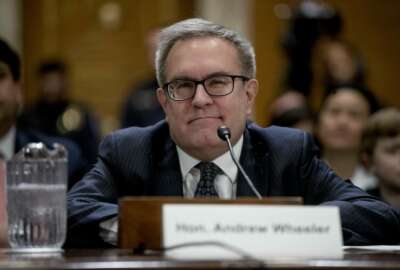
Senate Dems unamused by proposed budget cuts, low staffing at EPA
The White House proposed a 31.2 percent cut from the EPA's 2020 budget, including reductions in research and development funding by 45.8 percent.
For the third year in a row the Trump administration is proposing dramatic cuts to the Environmental Protection Agency, which Senate lawmakers do not seem eager to make. As Sen. Lisa Murkowski (R-Alaska), chairwoman of the Appropriations Subcommittee on Interior, Environment and Related Agencies told EPA Administrator Andrew Wheeler on Wednesday, “the final budget for EPA, as crafted by Congress, I think will look substantially different than this request.”
The White House proposed $6.1 billion for the EPA in fiscal 2020, a 31.2 percent cut from the estimated $8.8 billion it received in 2019 appropriations. The Office of Management and Budget said the request aims to “eliminate or substantially reduce federal investment in state environmental activities that go beyond EPA’s statutory requirements.” As a result, the proposal eliminates several water, air, lead, pollution, infrastructure grant or education programs are eliminated in the proposal.
EPA’s request also cuts research and development funding by 45.8 percent. Wheeler said the budget proposal supports EPA’s work to “reduce unnecessary regulatory burdens,” including 38 deregulatory actions over the past two years and another 39 actions planned.
“The Trump administration is proving that environmental protection and historic economic growth can go hand in hand,” he said.
But Ranking Member Tom Udall (D-N.M.), as well as other Democrats on the subcommittee, interpreted the proposal as a sign of EPA’s waning commitment to combating climate change or protecting public health.
“We hear repeatedly year after year that they would be, ‘happy to work with Congress on final spending levels,’” Udall said. “It’s a wink and a nod that the budget isn’t really real. But that, I submit to you makes it a mockery of the process. Budgets are statements of policy priorities and propose cuts of this terrible degree show us in clear print what this administration is about.”
Specific geographic programs in areas such as the Great Lakes and Chesapeake Bay would lose funding in the proposed 2020 budget, although President Donald Trump promised at a rally March 28 to fund the Great Lakes Restoration Initiative. Wheeler told the subcommittee Wednesday that EPA was working with the Office of Management and Budget to update the budget proposal but Udall remained skeptical.
“You know the proper thing to do is to submit an amended budget request, and we would expect you to do that for any of the others that he’s planning on doing rather than playing favorites and going to particular places that are important in next year’s presidential elections,” Udall said.
Low EPA staffing, morale sore spots for Dems
EPA’s struggle to fill positions and falling employee morale, particularly among agency scientists, also drew criticism from Udall and Sen. Chris Van Hollen (D-Md.). Udall said EPA is not replacing departing staff, which since the end of the Obama administration has totaled 8.5 percent; the research office alone has lost 14 percent of staff in that time.
“Mr. Wheeler, when you took over as acting administrator a year ago you and I discussed the need for EPA to retain and cultivate qualified staff,” he said. “But here we are a year later and numbers show that staffing levels are falling deeper into crisis, and that we also sit here examining a budget request to cut another 1,800 staff.”
Related Stories
“With fewer inspections, there are fewer opportunities to identify facilities that are out of compliance,” he said. “The staffing levels for the headquarters enforcement office has plummeted by 19 percent. That’s more than double the loss of rest of the agency and this subcommittee has not cut one dollar from EPA enforcement.”
The assistant administrator for research and development position remains vacant, and Van Hollen was not surprised, citing a critical op-ed in The Washington Post from Tuesday, written by Bernard Goldstein, who held the position during the Reagan administration and who criticized Wheeler’s actions as head of the agency as it pertains to scientific advisory. But Wheeler said the cumbersome and lengthy hiring and Senate confirmation process was the culprit.
“When you have the head of our superfund and emergency response has been waiting 394 days for confirmation, we literally have had people say ‘We don’t want to go through the Senate confirmation process,’” he said. “The Senate confirmation process is broken and I really hope it can be fixed on a bipartisan level.”
Copyright © 2025 Federal News Network. All rights reserved. This website is not intended for users located within the European Economic Area.
Amelia Brust is a digital editor at Federal News Network.
Follow @abrustWFED



